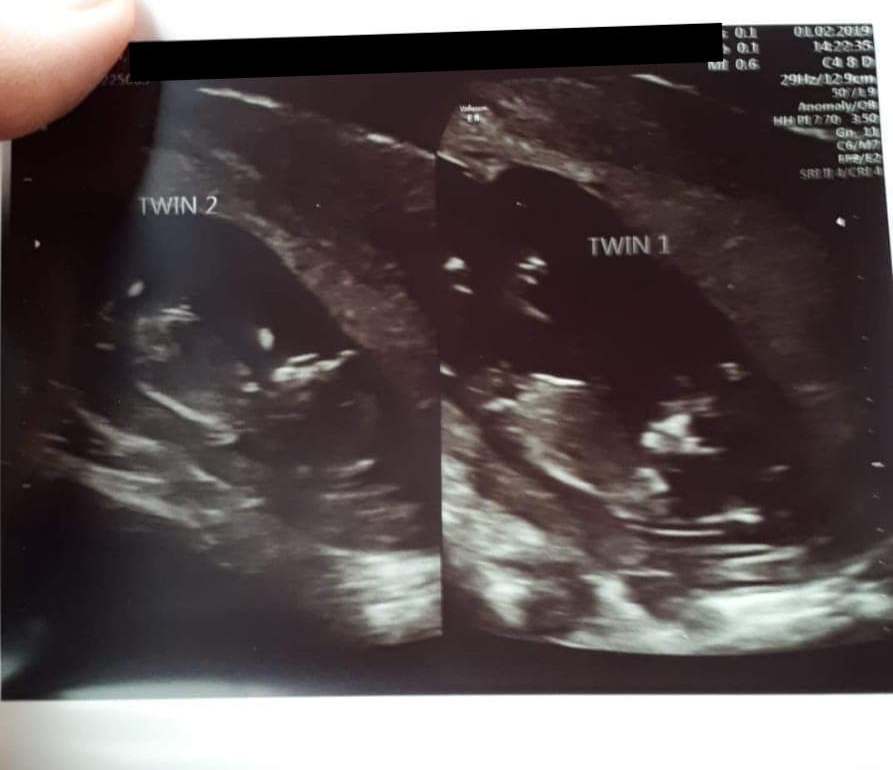
Whilst on duty as a midwife, my colleagues and I would often chat about our imagined pregnancies and births. On the postnatal ward, during those rare quiet shifts whilst all the mums and babies were sleeping, we would discuss whether or not we would want an epidural, a pool birth or a home birth. Never in my future did I envision anything other than a textbook conception, gestation and birth.
My journey to motherhood got off to a difficult start. We tried for a baby for a number of years before turning to IVF. We transferred one embryo back inside me, and 9 days later when I did a pregnancy test, we were gobsmacked to see it turn positive. Two weeks later I had a scan that showed our microscopic embryo had split into two babies, and we were expecting identical twins. We couldn’t believe after all our infertility heartbreak that something so wonderful was going to happen to us.

I found the pregnancy very difficult. The physical symptoms were debilitating, and I struggled with feeling guilty for not enjoying it more. I felt ashamed of my anxious thoughts, and too embarrassed to tell my midwife, who was also a colleague, that I was struggling both physically and emotionally. I spent the next few months living from scan to scan. Constantly nervous that our luck was going to run out. After years of heartbreak, it seemed too good to be true that our first round of IVF would work, and we would bring home two babies. When we passed the 20 week anomaly scan, I allowed a glimmer of optimism to emerge.

I was admitted to the antenatal ward of the hospital I work at when I turned 21 weeks due to some bleeding. As someone who spent their life looking after women in labour, it was a surprise to me that I didn’t recognise contractions in my own body. I spent the night awake, the surges coming every 5 minutes, but still optimistic that it might all stop. The next evening when my waters broke with a big gush, I knew it was all over. My babies were on their way, far too early for life saving intervention. I would be saying both hello and goodbye on the same day and my heart would be broken into a thousand pieces.
My colleagues offered me pain relief during the labour, but I declined. If the physical pain of labour stopped, I would then have to deal with the grief and trauma that birthing my babies would bring to me. The contractions were a welcome distraction.
Our tiny sons were born after a quick labour and afterwards we sat cuddling them, and admiring their features. They had my husband James’ lips and shoulders, and my chin and hands. Cecil & Wilfred died shortly after their birth, with their Dad, Grandma and myself all holding them tightly.

On returning from the hospital empty handed, I was filled with the desire to completely deep clean our home. Despite low iron level, exhaustion and grief, I climbed a ladder in my kitchen and began scrubbing the blinds. No one dared tell me to stop. The next few weeks passed in a blur of cleaning, crying and opening the door to receive bunches of flowers. I yoyo-ed between being grateful for the love and support, and wanting to throw every single bunch in the bin.
The day after their funeral, I realised that my bleeding was far too heavy. I became filled with fear that if I went to sleep that night I wouldn’t wake up, that I would bleed to death. I also worried that as a midwife, I should know better, and that I might be mocked if I attended hospital. As my hysteria grew, James drove me to A&E, where we found out that despite no trace of the pregnancy remaining visible to the naked eye, my uterus had decided to hold on to a 1cm piece of placenta. My body had failed me yet again. A week later I sat sobbing in a communal waiting area, where James was forbidden from being with me, awaiting surgery to remove it.
Subsequently we found out that the reason I went into premature labour was due to a condition delightfully known as ‘Incompetent Cervix’. Since this diagnosis, I have had a strong suture inserted through the abdomen into my cervix, to hopefully prevent this happening again. I am left with a scar that looks exactly the same as a caesarean section, and yet my arms are empty.
Like all parents, the birth of your first child or children is life changing. I feel strongly that I want to remember our sons with happiness and joy. Some days this is hard, but I know they have given us so much already. My empathy is far deeper than ever before and this experience has made me a more compassionate midwife. Having lived through an extremely anxious pregnancy, I want to listen and reassure women when they come to see me with worries. Carrying those thoughts around is hard work, and I like to lighten the load. Having spent several years attending various hospitals and clinics on what feels like a weekly basis, I now value highly how the kindness of health professionals impacts experience. I try my hardest to ensure that every family I see feels welcome and supported on their journey. I am also much more mindful of the language I use at work, as I have come to have a much greater understanding of how impactful that can be.
Parenting children that have died is not something I ever anticipated having to do. Unlike most people who can read books, or ask their friends for parenting tips, I have no one to ask. I often feel like my status as a mother is in question, simply because my sons were born before ‘viability’ – a term I find difficult to process. I try to speak openly about our experiences in the hope that others will find some comfort in knowing they aren’t alone. Baby loss is a difficult subject to broach, but I can’t bear the thought of our sons being a shameful secret.
For anyone going through the loss of their baby, I would encourage you to continue to talk to your partner. Infertility brought James and I closer together, and saying goodbye to the twins cemented our relationship further. Respect each other throughout, you will both grieve in different ways. Sometimes I have to remind myself that the twin’s weren’t just mine. They were also James’, and part of our wider family too.
There is no right or wrong way to grieve the loss of a baby. You can celebrate, remember or commemorate that little person or people however you see fit.
If you know someone who has lost a baby, please don’t be afraid to speak to them about it. It is more hurtful for me to think that people will forget about my son’s, than it is for me to talk about them. If you aren’t sure what the bereaved parents are comfortable with, ask them.

Cecil & Wilfred continue to be very much part of our family. Pictures, and reminders of them decorate our house. If we are fortunate enough to bring home a sibling, they will be taught about their older brothers. Despite the heartache of the past few years, I would do it all again in a heartbeat, if it meant I got to meet my sons again. Cecil & Wilfred will always be nothing short of miraculous to me.
Sophie x
You can follow my journey on instagram at @the.infertile.midwife





 Elle Wright is a wife, mother, author and blogger. After the death of her son, Teddy, at three days old, Elle started writing to navigate her new life and as a way to feel purpose again. Her Feathering The Empty Nest blog is a way of finding light in darkness, positivity in times of desperation and, hopefully, making a few people laugh along the way.
Elle Wright is a wife, mother, author and blogger. After the death of her son, Teddy, at three days old, Elle started writing to navigate her new life and as a way to feel purpose again. Her Feathering The Empty Nest blog is a way of finding light in darkness, positivity in times of desperation and, hopefully, making a few people laugh along the way.




A beautiful piece that spoke so deeply to me after losing my daughter at the same age. Well done for talking so openly about such a difficult topic x
I’m so touched by your story and grateful to you for sharing it. Your boys are so beautiful!
So beautifully written. I’m so sorry Cecil & Wilfred didn’t get to stay. My first born Daniel was born at 22+5, 27 years ago. There’s not a day goes by that I don’t think of him and who he would be now. I was incredibly lucky to go on to have 3 healthy children. There is hope, even in the darkest times xx